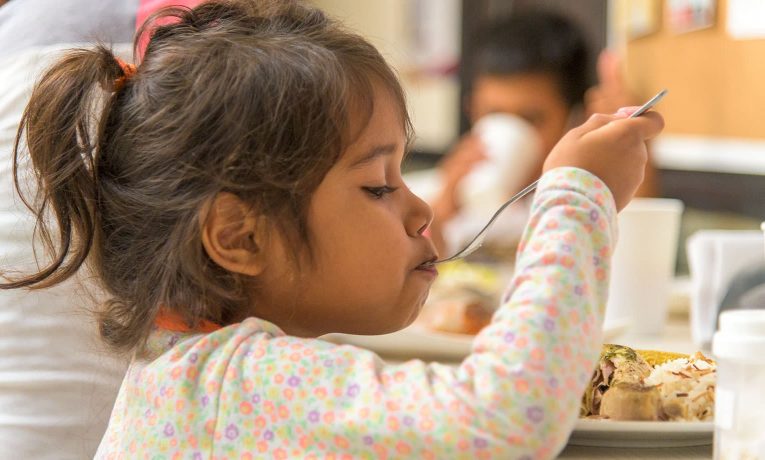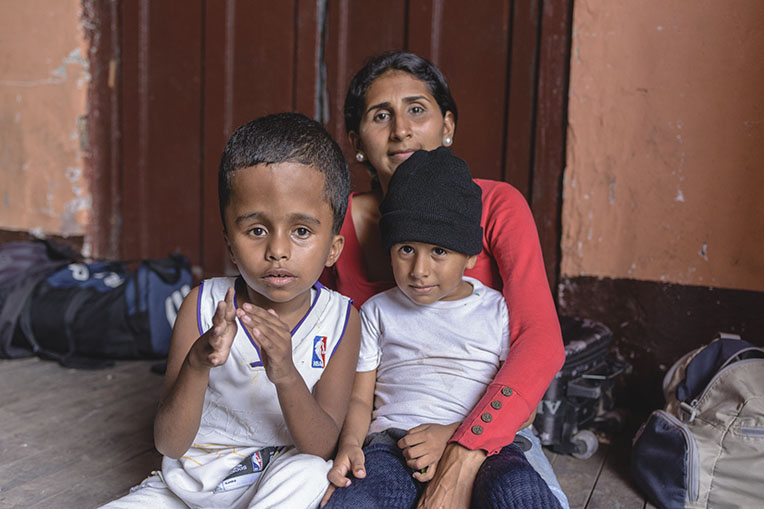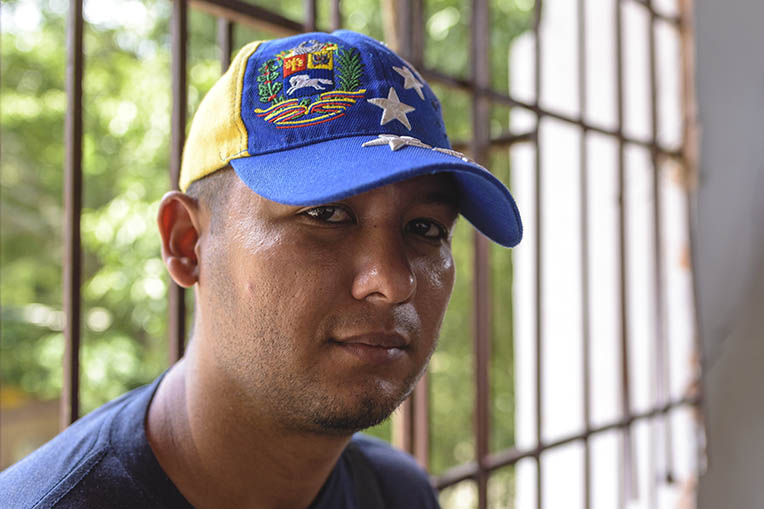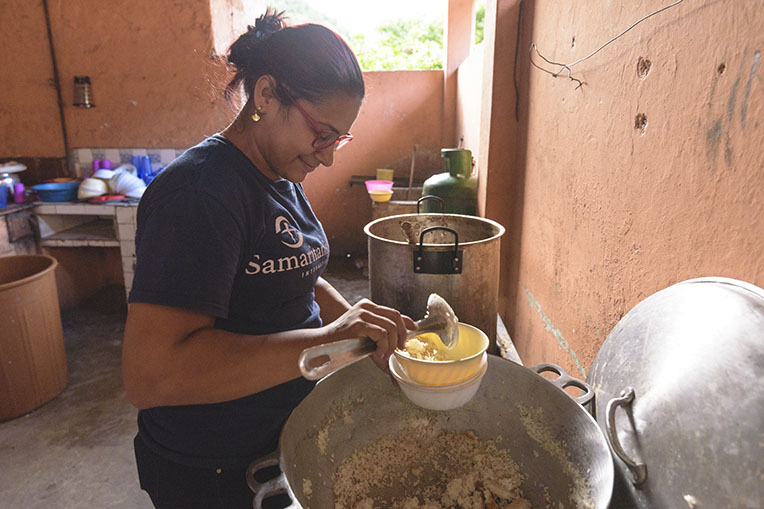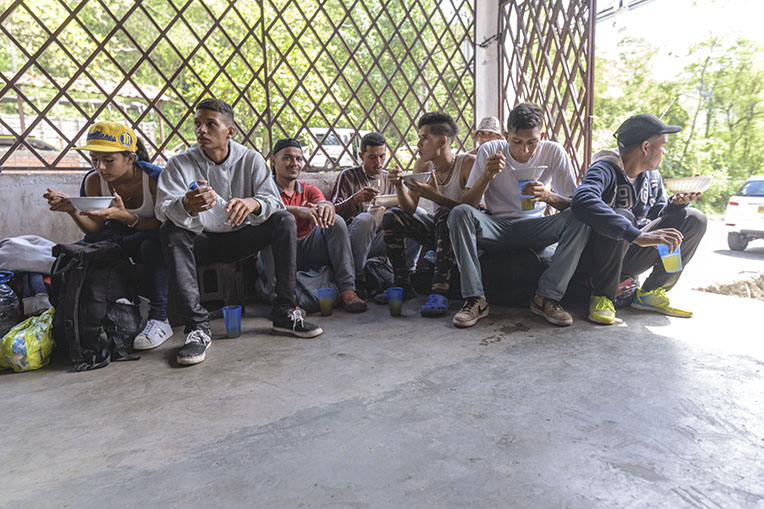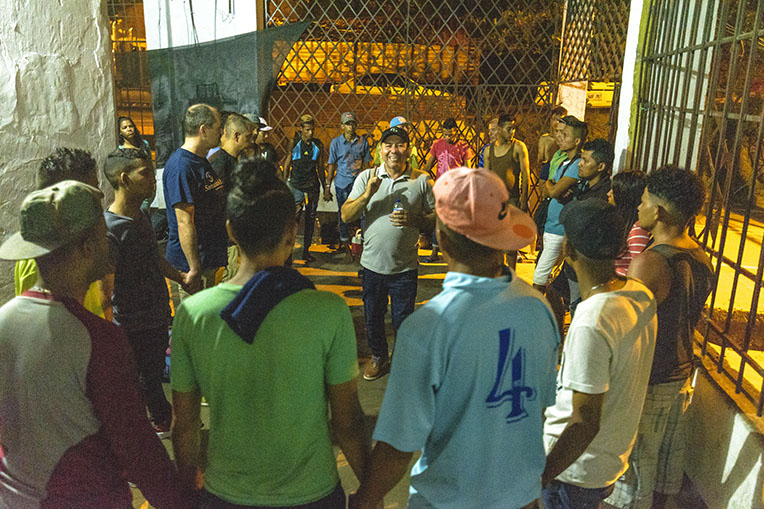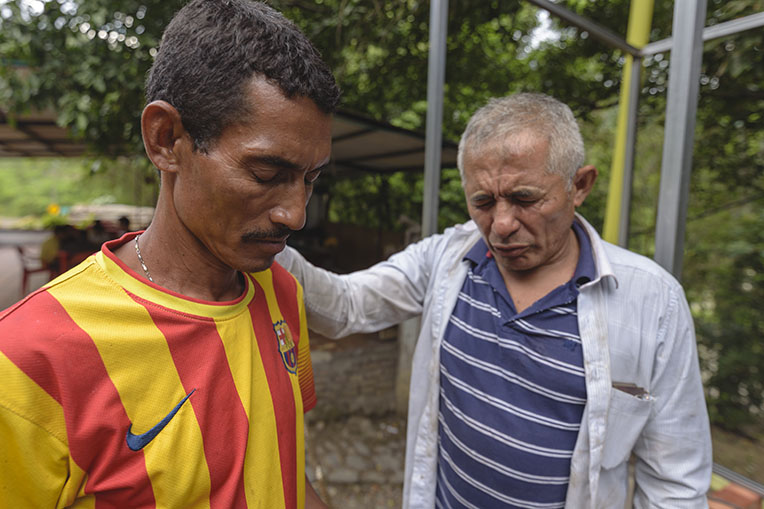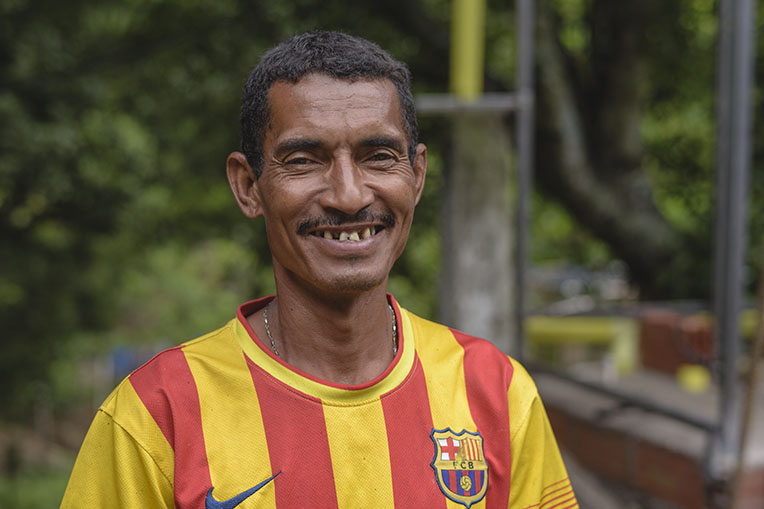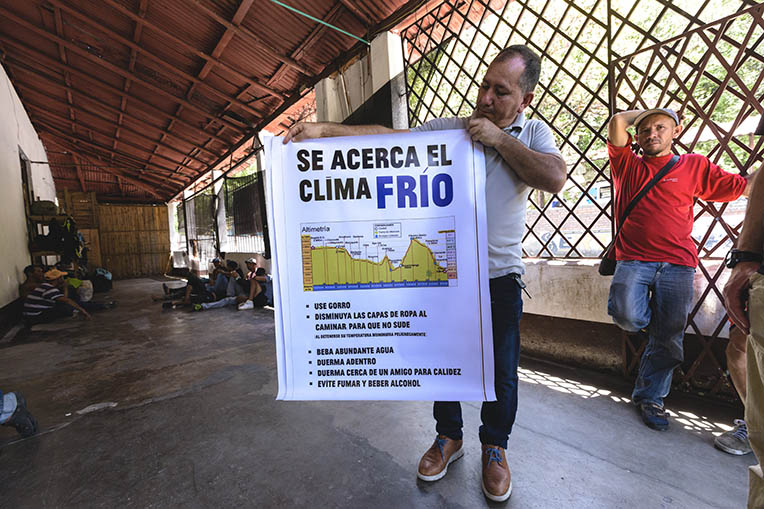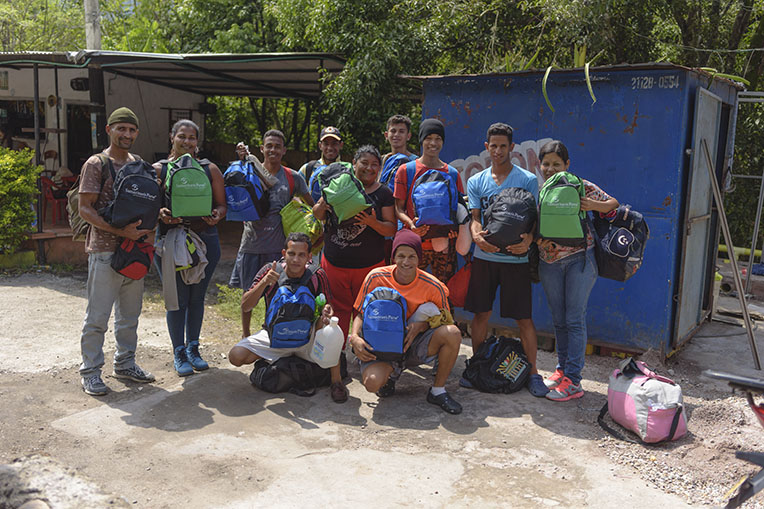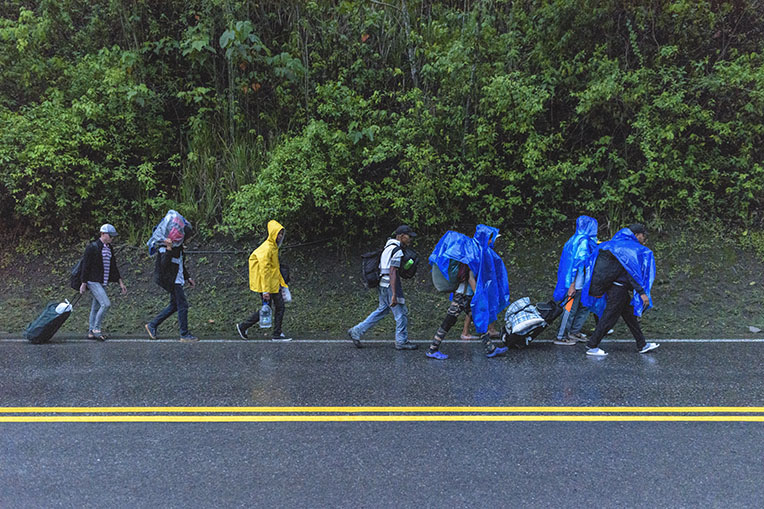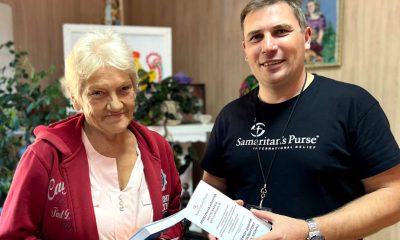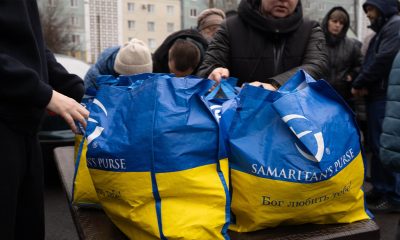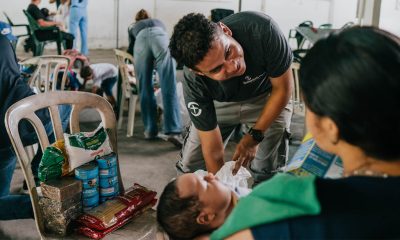We're caring for those fleeing economic crisis—offering food, shelter, backpacks, and the hope of the Gospel.
Each day, hundreds of people flee from Venezuela crossing into Cucuta, Colombia. Many of them have no plans to return home; instead they’ve chosen to leave behind their nation’s economic collapse and take their chances on starting a new life in a new country.
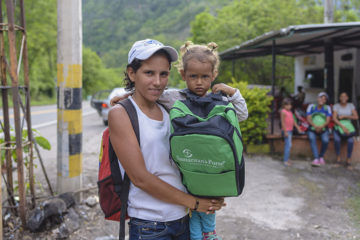
Thousands of backpacks filled with clothing and hygiene items have been distributed to walkers passing through our shelter.
Some of these men and women become los caminantes, or “the walkers,” who can be seen daily trudging up the roads that trail away from Cucuta. They’re headed into the Colombian mountains bound for other cities like Bucaramanga or Bogota, or even neighboring countries such as Ecuador or Peru. They’re often hoping to meet up with relatives and may walk or hitch rides for hundreds of miles. The journey could take several weeks, and all the while they’re at the mercy of strangers.
One place they’re sure to find a smiling welcome, though, is in the small town of La Don Juana, about 18 miles outside of Cucuta, where Samaritan’s Purse operates a way station, or shelter. Tens of thousands of migrants have passed through this facility in 2019 alone, and the stream of walkers continues every day.
Earlier this year, Marlenis, 11, and her mother, along with two relatives, stopped at our La Don Juana shelter. Marlenis said she thought they’d been walking two or three days already and were headed to Bogota—still hundreds of miles away. “I’m tired of walking,” she said.
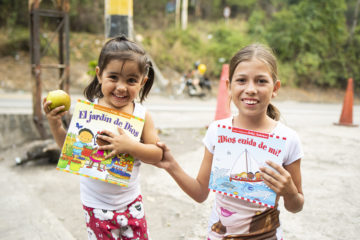
Marlenis and her cousin received children’s Bible story books in Spanish at our shelter in La Don Juana.
Sadly, Marlenis had to leave behind three older siblings in Venezuela—family separations are a tragic but common story among migrants. When asked what it’s like in Venezuela right now, Marlenis simply said, “Awful.”
Jorge, a 27-year-old from Valencia City, Venezuela, came to our shelter last fall. “I left because we had nothing to eat,” he said.
He bid farewell to his wife and two children, hoping to reunite with siblings in Lima, Peru—a journey of over 2,000 miles from Cucuta. He’s desperate to find work and send money back to support the family he left behind.
“The saddest thing is to hear from your kids—’Papa, I’m hungry’—and you have nothing to give them,” he said.
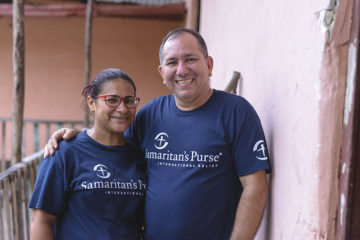
Pastor Jesus Paez and his daughter Viviana started this shelter serving migrants from Venezuela.
Samaritan’s Purse serves hundreds of hot meals each day, and we often host a couple hundred guests or more overnight. Right now, about 500 guests per night is the average.
Travelers who arrive earlier in the day help prepare the meals for later. In the evening, local church members or our staff share a Biblical message to encourage the travelers on their journey. Some migrants have turned to the Lord Jesus Christ in repentance and faith while at our shelter; a few have even been baptized in the river behind the facility.
A number of migrants simply stop at the way station for a brief rest out of the sun, quickly moving on to their next destination. Many others take a shower, eat a hot meal (or two), and spend the night in the building, which once served as a train stop. Thousands of migrants have received hygiene kits, which include toilet paper, a toothbrush, toothpaste, soap, and hand wipes. Additionally, many have also been given backpacks with a hat, gloves, socks, a water bottle, and a poncho. Women receive additional hygiene items as well.
“The saddest thing is to hear from your kids—’Papa, I’m hungry’—and you have nothing to give them.”
The hats and gloves may seem a bit much for an equatorial country, but if travelers continue on after La Don Juana, they’ve got a steep climb. The next major town is several thousand feet higher, and the road eventually tops off at about 11,000-12,000 feet above sea level. It gets cold at night, and the walkers are provided helpful counsel to go along with the warm clothing.
“I’m very thankful because they gave me food, and I could rest under a roof,” said Nelson, 22. He visited our shelter in October and was among the first to receive a backpack. He described the situation in his hometown of Falcon, Venezuela, as terrible—with no food and no work—so he’s headed to find relatives in Peru or work along the way.
The migrants are quick to help with meals or unloading supplies and grateful for the kindness. One group of six walkers, a mix of men and women, left a note on the kitchen wall that said, “We thank you on behalf of the Venezuelan people for the hand that you’re lending day-after-day to Venezuelan immigrants. We don’t walk alone, God is ahead of us.”
“Let’s Do Something”
The flood of those leaving Venezuela in the past couple years has become the largest migration crisis in recent Latin American history. Young men and women, sometimes with small children, leave because of the dire lack of food and medicine. Due to hyperinflation, a full month’s salary can now only buy a few food items, hardly enough to sustain a family. Hospitals don’t even have adequate supplies.
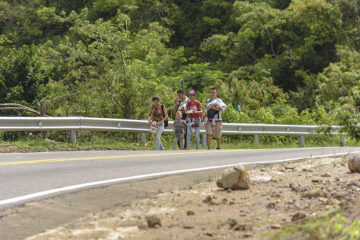
Venezuelan “walkers” are a common sight along the roads near Cucuta.
A woman named Nazareth left Venezuela and stopped by our shelter to spend the night with her two children, Osmond, 10, and Oswald, 4. Osmond uses a wheelchair, which complicates travel, but she’s determined to persevere and is headed to join her husband in Peru. He’s been sending back money for the family, but it’s not nearly enough.
“We don’t have medicine, the healthcare system doesn’t work. We can’t find meat or rice,” Nazareth said. “The reason I left is because it’s not a good life for my children.”
In mid-2018, Jesus Paez, a local pastor, began noticing more and more Venezuelans stopping in his area as they made their way across Colombia.
“I was driving up and down every day with my family. At night we saw people sleeping in the road—50 people or so,” he said. “We saw the kids and families in the rain. So, I decided, let’s do something about this.”
Pastor Jesus and his daughter Viviana promoted a “Day of Mercy” in July on social media, and they got tremendous support from the community. Many people donated clothes and food for the migrants. They even set up a tarp to provide shelter at the local restaurant where the event was held. After about a month, the number of caminantes outstripped the capacity of that makeshift space, but God provided an alternative.
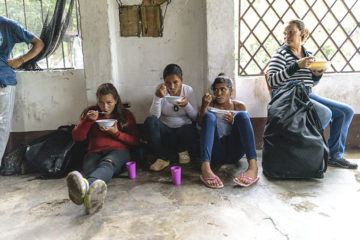
A group of women stop for soup at our shelter in La Don Juana.
A friend offered Pastor Jesus the opportunity to use an old train station as a shelter. The location provides ample space for meal service and sleeping quarters. His daughter, Viviana, went to work serving daily meals and hosting migrants through the night.
Last year, Samaritan’s Purse came alongside the Paez family to begin improving the facility, underwriting the rent, and purchasing groceries. Since that time, we’ve also installed new toilets and showers, repaired the roof, and upgraded the electrical system and kitchen. An electro-chlorinator now provides clean water for visitors.
“Thank you for being a part of this vision,” Pastor Jesus said. “I feel a huge relief now that you’re involved. I came really close to saying, ‘We’re closing.’”
People often ask him how the shelter continues to operate, and he said many assume it’s government-funded. But he’s ready with a different answer. “We are very pleased to tell them the help is from God’s people.”
—
NOTE: This article was originally published in Dec. 2018, then updated in Feb. and April 2019. The final updates were made May 2, 2019. Find out more on our Colombia relief landing page and get links to other recent articles.
Jose Tamara is the new shelter coordinator for Samaritan’s Purse in La Don Juana. He says people notice the way our staff members treat migrants with dignity and love. “A lot of people ask, ‘Are there more of these Samaritan’s Purse shelters along the journey? If there are, we’ll go to those.'”
Since this article was originally published, Samaritan’s Purse has opened a second shelter along the caminantes trail in Colombia, high in the Andes at a town called Berlin. You can read some about the Berlin shelter aquí.
